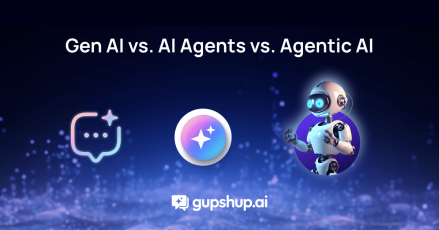How South African Logistics Brands Can Reduce Operational Costs with Conversational AI

Imagine a day in the life of an operations manager at a leading logistics company in South Africa. Every day, you juggle a multitude of tasks – from coordinating deliveries to handling customer inquiries. You constantly strive to streamline operations, but the challenges seem endless.
What if there was a way to handle all these tasks seamlessly and efficiently?
Introducing WhatsApp bot for enterprise in SA. This isn’t just any bot; it’s a powerful conversational AI designed to automate customer interactions and streamline your operations. From tracking packages to answering customer queries, conversational AI handles it all with precision and speed.
The South African logistics market is expected to reach $30.56 billion by 2029; this clearly plays an important role in the economy of the country. With South Africa securing the fourth spot in the 2022 Africa Infrastructure Development Index, the country’s advanced infrastructure provides a reliable backbone for transportation, warehousing, and distribution.
Key drivers like the African Continental Free Trade Agreement (AfCFTA) are fueling logistics growth by removing trade barriers and opening up vast trade opportunities. Government commitments to the National Development Plan (NDP) and the National Infrastructure Plan 2050 (NIP) further attract foreign investments, benefiting the logistics sector.
The surging African e-commerce sector, poised to hit $46 billion by 2025, increases the demand for efficient logistics. As more consumers shop online, there’s a growing need for streamlined warehousing, inventory management, and swift last-mile deliveries.
Embrace this technology today and witness a dramatic reduction in operational costs while boosting your efficiency and customer satisfaction. Let’s dive into the blog to learn how to reduce costs using conversational AI in South Africa.

How Can South African Brands Use Conversational AI To Reduce Costs?
The main concern of a logistics company is to reduce costs while trying to maintain customer service precision. Here’s how you can do it –
-
Implement Conversational AI-Driven Customer Support Systems
There is one thing that a customer never forgets – excellent customer service by a brand/business. And logistics companies aiming for long-term success must implement this in their customer engagement strategies.
Here’s something to consider: once a human agent has interacted with the customer on a service call, they provide support, and the query is closed. But what if the customer has more complaints? What if they have more questions that need to be answered?
This is where WhatsApp API for logistics business comes in. The conversational AI-driven customer support provided by these bots offers consistent, ongoing value by handling routine interactions efficiently.
So, instead of focusing on short-term fixes, it’s better to channel energy towards building a lasting customer experience. Here’s how:
- Consistency at Every Touchpoint: Deploy conversational AI chatbots to manage FAQs, order tracking, and basic support queries. This ensures every customer interaction is handled smoothly and consistently, reducing the need for human agents and keeping your service reliable.
- Addressing Core Customer Needs: While logistics trends may evolve rapidly, core customer needs like timely updates and reliable information remain constant. AI chatbots cater to these needs efficiently, creating a lasting impact by speeding up response times.
- Establishing a Trustworthy Service Tone: Automated systems like AI chatbots maintain a consistent and empathetic tone, addressing customer pain points and building a loyal customer base. Even as technology evolves, the trust built through reliable service remains.
Thus, logistics companies in South Africa can focus on long-term brand-building by automating routine customer interactions. This strategic approach ensures that service remains evergreen and memorable.
2. Optimize Workforce
Are you making the most of your workforce?
Truth is, it’s easy to get stuck in routine tasks. In logistics, repetitive activities can consume valuable time and resources. Thus, implementing WhatsApp API in the logistics business can revolutionize workforce management by taking over these mundane tasks. This will allow human agents to focus on more value-added activities that require critical thinking and problem-solving skills. Here’s how:
- Streamline Human Resources: Conversational AI can facilitate communication between different departments within a logistics company, ensuring that everyone is on the same page regarding schedules, inventory levels, and delivery statuses. This way, the right person is doing the right job, cutting bottlenecks and boosting productivity. Plus, AI scheduling is fairer and more efficient, eliminating human bias and errors.
- Scale Operations Efficiently: Conversational AI systems can adjust workforce deployment on the fly based on demand and operational changes. This flexibility reduces downtime and maximizes resource use, allowing companies to scale operations without extra costs.
- Real-Time Monitoring and Adaptation: Conversational AI constantly monitors workforce performance and operational metrics to spot opportunities for improvement. By analyzing data in real-time, AI can detect anomalies, predict potential problems, and suggest proactive measures to reduce risks.
By using WhatsApp bot for enterprises in SA, logistics companies can ensure their workforce is used to its fullest potential. This leads to smoother operations, significant cost savings, and happier customers.
3. Automate Internal Logistics Processes
Logistics companies worldwide use conversational AI because traditional methods are becoming obsolete. With a WhatsApp bot for business in SA, things can run much smoother. Let’s see how conversational AI is tackling the traditional problems –
- Documents piling up? No problem. Conversational AI uses Optical Character Recognition (OCR) and Natural Language Processing (NLP) to tackle those invoices and customs forms, cutting down on errors and speeding things up.
- Worried about inventory? AI has got it covered. It monitors stock levels in real-time, reorders automatically, and tracks shipments. Plus, with the WhatsApp API for logistics business, you get instant notifications about inventory status and low stock, keeping everything in check.
- Route planning giving you a headache? AI analyzes traffic and weather to find the best delivery routes, saving fuel and ensuring timely deliveries. Real-time updates via WhatsApp keep drivers and dispatchers in sync, reducing delays.
- Equipment breakdowns? AI predicts failures through sensor data analysis, and scheduling maintenance before problems arise. WhatsApp alerts keep everyone informed, minimizing disruptions.
- Is manual order processing taking too long? AI speeds up shipment assignments and tracking. Real-time WhatsApp updates keep customers and stakeholders in the loop, enhancing satisfaction.
- Warehouse management feeling chaotic? AI-driven robots and drones handle picking, packing, and inventory management, reducing errors and boosting productivity. WhatsApp updates keep managers informed about stock and orders.
-
Use Data-Driven Decision Making
Yes, handling day-to-day logistics operations is a challenge. However, one has to navigate those challenges efficiently while keeping the customers happy. That’s where data-driven decision-making comes in. So, here’s how it can work for you –
- Better Forecasting and Planning: Use AI to forecast demand accurately. This means you can plan better for inventory, staffing, and resources, avoiding overstocking or stockouts.
- Leverage AI for Customer Insights: WhatsApp bot for business in SA can analyze customer interactions to understand their feelings and needs. This helps you optimize processes and reduce costs while tailoring your services for better results.
- Real-Time Operational Visibility: Get a clear, real-time view of your supply chain. Monitor shipments, track vehicles, and manage warehouse activities, making quick adjustments to boost efficiency.
- Proactive Risk Management: AI can spot potential risks early. It can predict equipment failures or bad weather and address issues before they become problems, keeping operations smooth and protecting your reputation.
- Top-Notch Customer Service: Using Conversational AI with WhatsApp API, you can enhance customer service. AI chatbots can handle inquiries, provide shipment updates, and resolve issues quickly, keeping customers engaged and satisfied.
-
Automate Marketing and Sales Efforts
Using conversational AI for marketing and sales helps logistics companies engage with customers, boosting effectiveness and reducing costs.
AI-driven marketing helps create highly personalized campaigns by analyzing extensive customer data, such as behavior, preferences, and purchase history. They automatically send tailored messages, ensuring customers receive content that resonates with them without manual intervention.
Examples include personalized email campaigns, product recommendations, and optimized ad spending on the most effective channels.
Cart abandonment is also a significant issue in e-commerce, leading to lost sales. AI can address this by sending automated follow-ups and reminders, encouraging customers to complete their purchases.
Automated and personalized messages on WhatsApp can remind customers about items left in their cart and offer incentives like discounts or free shipping. This approach helps recover lost sales and boost revenue.
Key takeaways –
- Conversational AI crafts campaigns that speak directly to each customer, increasing satisfaction and interaction.
- Conversational AI handles the heavy lifting, sending personalized messages without manual effort, allowing teams to focus on strategy.
- AI-driven follow-ups significantly reduce cart abandonment rates, providing customers the push they need to complete purchases and increasing revenue.
Integrating AI in marketing and sales efforts enhances customer engagement, reduces costs, and drives growth for logistics businesses, making operations more efficient and customer-friendly.
Conclusion
Conversational AI is a game-changer for South African logistics companies. From enhancing customer support to leveraging data for better decision-making, AI offers numerous benefits that streamline operations and cut costs.
Embracing AI technologies like the WhatsApp API for logistics business enables companies to provide exceptional customer service, improve efficiency, and stay competitive in a rapidly evolving market.
Are you ready to revolutionize your logistics operations with conversational AI? Partner with Gupshup, the leading messaging platform, to deploy AI-driven solutions tailored to your needs. Enhance your customer interactions, automate routine tasks, and drive your business forward.
Contact Gupshup today to learn how we can help you transform your logistics business.
FAQ
How can AI streamline logistics operations and reduce costs?
AI streamlines logistics operations by optimizing routes, automating warehouse management, and improving inventory accuracy. It reduces transit times and fuel consumption, leading to lower transportation costs and enhanced delivery accuracy, which boosts profitability and customer satisfaction.
How do the logistics and supply chain fields benefit from AI?
The logistics and supply chain field benefits from AI through improved demand forecasting, real-time tracking, and predictive maintenance. AI also helps improve inventory management, reduce stockouts and overstocking, and enhance overall supply chain efficiency by analyzing vast amounts of data to identify patterns and predict future trends.
What are the advantages of AI in the transportation industry?
AI improves transportation by optimizing routes, reducing fuel consumption, and enhancing delivery times. It also predicts vehicle maintenance needs, preventing breakdowns and ensuring efficient operations.






